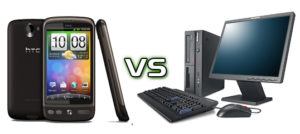Smartphones and tablets have gotten more powerful and capable over the last 5 years. Many people rely on them as their primary device to access the Internet or to consume media (stream video, listen to music). But are they really ready to replace a computer? In this article we’ll clarify the differences between computers & mobile devices, and hopefully answer any questions.

What is a computer?
A computer is an electronic device that accepts input from a source, then performs calculations based on that input & instructions provided via the operating system and/or application software, and outputs the result.
But wait, don’t smartphones and tablets do that too? Yes, by most definitions, they are computers. So you might ask, what’s the big difference?
Input
Users typically interact with computers via keyboard and/or mouse. There are many peripherals that are variations on those input devices such as touchpads and stylus. Another popular input method is via touchscreen, most popularly found on laptops and all-in-one computers.
Tablets & smartphones are primarily interacted with via their touchscreens. Almost all of them can also utilize a stylus and many have the capability of connecting a keyboard via Bluetooth. Some higher end tablets have USB ports to connect devices physically.
Power
A desktop computer is energized by a power supply that typically ranges from 300W to 750W, which is plugged into a wall socket. This ensures continuous power which is demanded by the powerful CPUs. This power also tends to generate heat requiring fans, heatsinks, or other cooling accessories.
Smartphones and tablets run on batteries, most commonly the lithium ion rechargeable non-removable type. They use much less powerful CPUs so the energy needs are much less. Mobile devices are indeed getting more powerful every day, but there is a long way to go before they can compete with the power of a traditional laptop or desktop.
Display
Desktop computers can connect to the monitor of your choice, and most support having two or more monitors. Standard desktop monitors are usually 19”-24” with resolutions between 1600×900 and 1920×1080. Some high-end monitors are 4K capable and can display resolutions of 3840×2160 on screens 24” or larger. Laptops have built in monitors which vary in size from 11”-17” and display a similar range of resolutions to their desktop counterparts.
Tablet screens come in a wide variety of sizes, typically 7”-12”. Smartphone screens, although smaller (4.5”-6.2”), tend to be a bit more advanced. Some in the current generation can even display 4K!
Storage
Computers typically have hard drives between 250GB-2TB in size.* This allows an average computer to store a tremendous amount of data. You can also attach external hard drives to a computer for even more storage options.
Smartphones & tablets typically have relatively tiny storage capabilities compared to a computer, usually ranging 8GB-64GB, but sometimes with expandable storage via a micro SD card.
The Short of it
Although they can emulate many of the functions of a computer, smartphones & tablets are primarily designed for content consumption (watching videos, browsing the Internet, reading email, playing casual games). Traditional desktop and laptop computers are still where most content is created, where real work gets done and where serious computer games are played. Mobile devices are very convenient for casual tasks, but traditional computers have the power and versatility to accomplish nearly anything you could want a computer to do.
Hopefully, this post clarified any confusion you may have had distinguishing a computer and a mobile device. Geek Easy Computers wants to make your technology easier!
*Chromebooks and other budget systems could come with as little as 16GB of storage while desktop systems could easily have half a dozen 6TB drives installed. Most laptops and desktops brought in for repair tend to fall within the 250GB-2TB range.
 |
Adonis Pointer is a photographer, a collector of vintage razors, and a certified technology geek!
Adonis has been involved in computer technology since well, a LONG time! He has been involved in nearly every aspect of the industry from sales to repair to training to consulting. As the Social Media Manager he writes the majority of the posts on the Geek Easy Computers blog. |